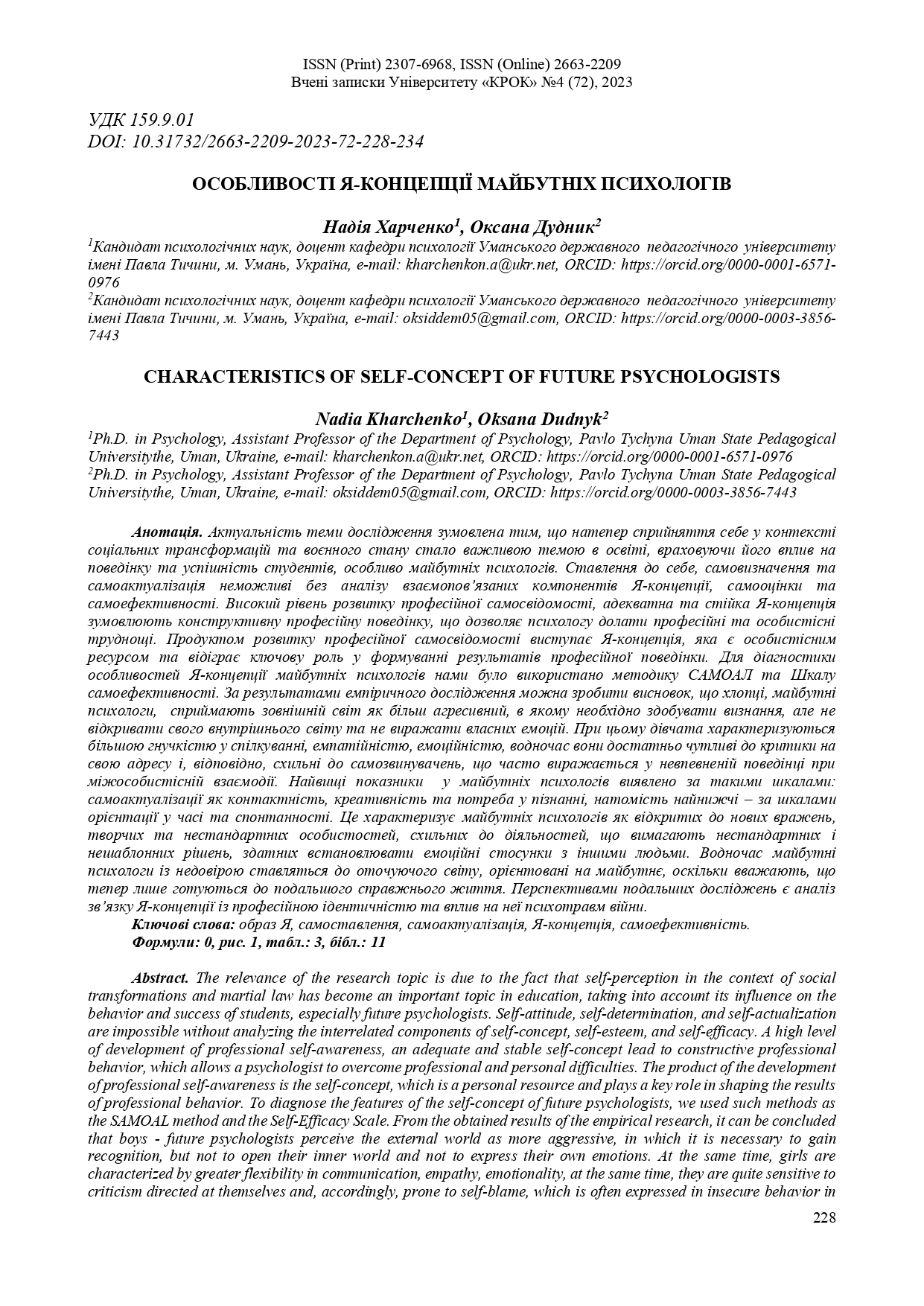CHARACTERISTICS OF SELF-CONCEPT OF FUTURE PSYCHOLOGISTS
DOI:
https://doi.org/10.31732/2663-2209-2023-72-228-234Keywords:
self-image, self-attribution, self-actualization, self-concept, self-efficacyAbstract
The relevance of the research topic is due to the fact that self-perception in the context of social transformations and martial law has become an important topic in education, taking into account its influence on the behavior and success of students, especially future psychologists. Self-attitude, self-determination, and self-actualization are impossible without analyzing the interrelated components of self-concept, self-esteem, and self-efficacy. A high level of development of professional self-awareness, an adequate and stable self-concept lead to constructive professional behavior, which allows a psychologist to overcome professional and personal difficulties. The product of the development of professional self-awareness is the self-concept, which is a personal resource and plays a key role in shaping the results of professional behavior. To diagnose the features of the self-concept of future psychologists, we used such methods as the SAMOAL method and the Self-Efficacy Scale. From the obtained results of the empirical research, it can be concluded that boys - future psychologists perceive the external world as more aggressive, in which it is necessary to gain recognition, but not to open their inner world and not to express their own emotions. At the same time, girls are characterized by greater flexibility in communication, empathy, emotionality, at the same time, they are quite sensitive to criticism directed at themselves and, accordingly, prone to self-blame, which is often expressed in insecure behavior in interpersonal interaction. The highest indicators of future psychologists were found on such scales of self-actualization as contact, creativity and the need for knowledge, on the other hand, the lowest - on the scales of orientation in time and spontaneity. This characterizes future psychologists as open to new impressions, creative and non-standard personalities, prone to activities that require non-standard and non-standard solutions, capable of establishing emotional relationships with other people. At the same time, future psychologists distrust the world around them, are oriented towards the future, because they believe that now they are only preparing for further real life. Prospects for further research are the analysis of the connection between the self-concept and professional identity and the impact of the psychological trauma of the war on it.
Downloads
References
Лукомська, С. О., & Чуйко, О. В. (2013). Термінологічні аспекти професійної ідентичності. Науковий вісник Миколаївського державного університету імені ВО Сухомлинського. Серія: Психологічні науки, (2, Вип. 11), 184-186.
Перепелюк, Т. Д. (2017) Роль Я-концепції особистості у професiйному становленні практичного психолога. Актуальні наукові психологічні та педагогічні дослідження сучасності : VІ-та Всеукраїнська наукова Інтернет-конференція (26-27 жовтня 2017 р.): тези доп. / Відп. Ред. Г.М. Ржевський, Т.Д. Перепелюк, 21-23.
Сингаївська І. В. (2021). Особливості формування професійної компетентності майбутніх викладачів психологічних дисциплін. Освіта та наука: трансформація, відповідальність, академічна свобода: матеріали наукової конференції (5 березня 2021 р.). Київ. 137–139.
Arafah, K., Arafah, A. N. B., & Arafah, B. (2020). Self-concept and self-efficacy’s role in achievement motivation and physics learning outcomes. Opción: Revista de Ciencias Humanas y Sociales, (27), 95.
Arens, A. K., Jansen, M., Preckel, F., Schmidt, I., & Brunner, M. (2021). The structure of academic self-concept: A methodological review and empirical illustration of central models. Review of educational research, 91(1), 34-72.
Kawamoto, T. (2020). The moderating role of attachment style on the relationship between self-concept clarity and self-esteem. Personality and Individual Differences, 152, 109604.
Noviandari, H., & Mursidi, A. (2019). Relationship of Self Concept, Problem Solving and Self Adjustment in Youth. International Journal for Educational and Vocational Studies, 1(6), 651-657.
Postigo, Á., Fernández-Alonso, R., Fonseca-Pedrero, E., González-Nuevo, C., & Muñiz, J. (2022). Academic self-concept dramatically declines in secondary school: personal and contextual determinants. International journal of environmental research and public health, 19(5), 3010.
Rohmalimna, A., Yeau, O., & Sie, P. (2022). The Role of Parental Parenting in the Formation of the Child’s Self-Concept. World Psychology, 1(2), 36-45.
Tus, J. (2020). Self–concept, self–esteem, self–efficacy and academic performance of the senior high school students. International Journal of Research Culture Society, 4(10), 45-59.
Zhang, Z., Jiménez, F. R., & Cicala, J. E. (2020). Fear of missing out scale: A self-concept perspective. Psychology & Marketing, 37(11), 1619-1634.

Downloads
Published
How to Cite
Issue
Section
License

This work is licensed under a Creative Commons Attribution-NonCommercial 4.0 International License.

